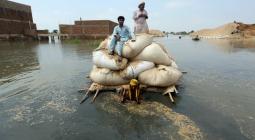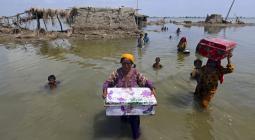Cop27: is it right to talk of ‘reparations’?
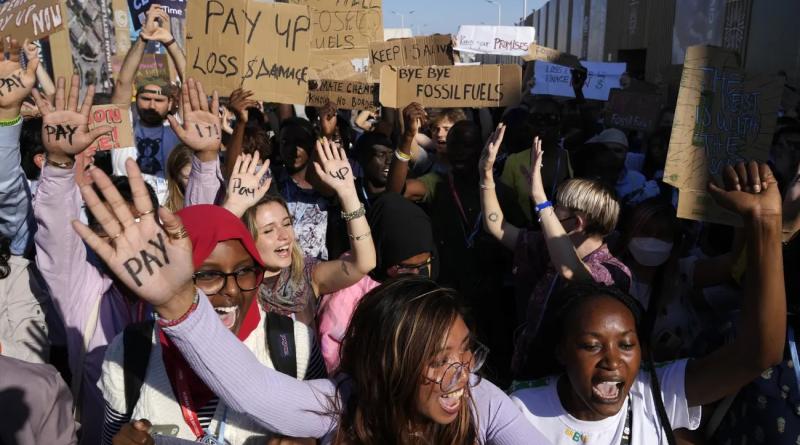
Negotiations are centred on ‘loss and damages’ – but some think that language does not fully account for climate debt
Todd Stern, the US climate envoy to Barack Obama who negotiated the Paris climate treaty on behalf of the US, recalls how at his first UN climate summit in 2009, the first question at his first press conference caught him offguard.
“I had just arrived, and I was asked: do you believe in paying reparations to developing countries?” he recalls. “I said no, absolutely not. But I certainly believe in significant support for developing countries.”
The issue of reparations struck him as one that should be relegated to the fringes of climate discussion. “It is not legitimate, as a matter of substance, and it is very wrong-headed as a matter of strategy. All that framing does is just make it much harder for developed countries to agree to [paying climate finance to developing countries],” he says.
Talk of climate reparations has resurfaced at the Cop27 UN climate summit, now nearing its end in Egypt, as once again the divisions between rich and poor countries over the climate crisis are in the spotlight. Civil society activists have vociferously demanded reparations, as a moral obligation, calling for the transfer of trillions from the wealthiest to the poorest. Some have also sought to frame the issue as a question of “liability” and “compensation” from the rich to the poor. Few developing countries call for reparations publicly, as it has become such a contentions and – for some – historically loaded term.
Their call has been eagerly amplified by sections of the rightwing media. But rather than a rallying cry, the right presents it as a threat, and proof that the climate crisis all along was really rooted in envy of the economic success of the rich world.
“[Reparations] is a toxic term,” said one longtime participant and adviser in international climate action. “I sympathise with the sentiment, but you are not going to get anyone from a developed country to use that term and it’s not helpful. Why not focus on the substantive issue: how to get rich countries to pay for help for poor countries, without getting bogged down in unhelpful language?”
Mary Robinson, former president of Ireland and twice a UN climate envoy, now chair of the Elders group of former statespeople and leaders, will not use the terms ‘reparations’, ‘compensation’ or ‘liability’. “I can understand why people talk about reparations, but I talk about climate justice,” she told the Guardian. “I think that is much better language. There is a responsibility that the polluter should pay, but it’s just not productive getting into terms like ‘reparations’, you get lawyers involved. But if we talk about justice, we can get somewhere.”
Climate debt
The concept of climate justice evolved within civil society movements in the global south through an understanding that the developed world owes a climate debt to developing countries. Many argue that the notion of reparations has become a central tenet of climate justice, as has debt cancellation. And as the climate breaks down faster than even the worst-case scenario predictions – way too fast and erratically for even the richest countries to adequately adapt and prepare – the demand for climate justice and reparations has intensified.
The central facts are not disputed: developed countries created most of the climate problem, through their abundant greenhouse gas emissions since the Industrial Revolution. Meanwhile, the least developed countries, which are responsible for a tiny fraction of global emissions, are suffering most from the impacts, for which they need and deserve help.
When the UN Framework Convention on Climate Change (UNFCCC), under which the annual “Cops” or conferences of the parties take place, was signed in 1992 it introduced the concept of “common but differentiated responsibility”. That meant developed countries must cut their emissions fastest, and under the 1997 Kyoto protocol they were also supposed to provide finance to poor countries through a system of carbon trading.
At the 2009 Cop15 Copenhagen conference that progressed to a formal commitment by rich countries to ensure a flow of at least $100bn (£837m) a year by 2020 to the developing world to help poor countries cut their greenhouse gas emissions and adapt to the impacts of extreme weather.
Rich countries have failed so far to meet that target, but last year at Cop26 in Glasgow reaffirmed that it would be met from next year.
Where rich countries draw the line, however is at talk of reparations, compensation or liability, because these terms have specific legal meanings. Agreeing in a formal, legally binding document under the UNFCCC to finance on such terms would open up countries to potentially limitless lawsuits and payments.
Talk of reparations also does not make historical sense, argues Stern, now a senior fellow at the Brookings Institution thinktank. While rich countries were emitting carbon dioxide, through burning fossil fuels, to power the Industrial Revolution, most had little idea until about 40 years ago that this was a problem. A few scientists raised concerns, but impacts from the increasing atmospheric concentration of carbon were generally regarded as a long way off and minor.
“[Industrialisation] was mostly done without any understanding that there was such a thing as global warming and without good alternatives,” says Stern. “And, of course, developing countries have used the same technology to industrialise, including the largest among them, China, which is now the second largest historic emitter.”
But Kehinde Andrews, professor of black studies at Birmingham City University, says people have to consider what gave rise to the Industrial Revolution in the first place. “It was based on the exploitation of persons through slavery, and colonialism [and] genocide; those are the things which really allowed western development to happen,” he said.
“So the impact of climate change on the underdeveloped world is very clearly and directly linked to their exploitation by developed countries.”
Language matters, Andrews argues, in describing the reality behind geopolitics today.
“Global inequality is built on white supremacy,” he said. “But … the UN, the World Bank, they will not mention it. It’s the most obvious thing but they will never talk about it. And this climate reparations thing is the same thing, right? It’s blatantly obvious what’s happening. But we have to ignore it.
“Stop talking about loss and damage, [that’s] just falling into that same trap that we always do because we don’t want to acknowledge the actual reality of what built the world.”
Irreversible suffering
“Loss and damage” refers to the most severe impacts of the climate crisis, too great for countries to adapt to or prepare for. Examples include the recent floods in Pakistan, which devastated the country, putting 20 million people in need of humanitarian aid, and the ongoing drought in Africa, the worst in 40 years, which has taken 150 million people to the brink of extreme hunger.
Developing nations have been pushing hard for a loss and damage funding facility at Cop27 – in addition to the adaptation and mitigation mechanisms – to respond to the irreversible economic, social and cultural losses and damages already suffered.
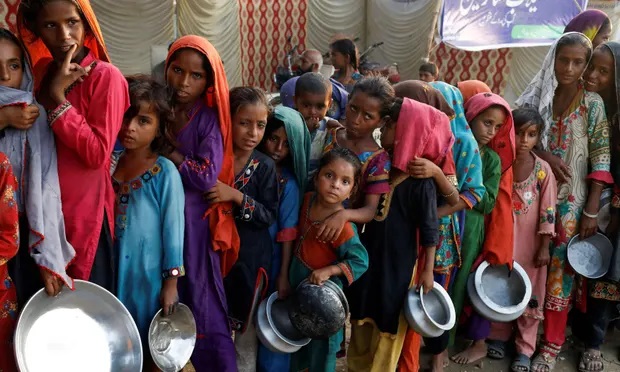
“Loss and damage is not charity, it is climate justice,” says Nabeel Munir, a Pakistani diplomat and chief negotiator for the G77 bloc of developing countries plus China.
Nicholas Stern, former chief economist of the World Bank and author of the 2016 Stern Review of the economics of the climate crisis, says arguments over reparations, compensation and liability will delay loss and damage. “These are unhelpful terms, especially in the context of the risks of being divisive,” he said. “We want rich countries to step up. Do they have a moral obligation? Yes. And they accept that. But if you say ‘reparations’ or ‘compensation’ you are using formal legal terms that mean a pushback. We know we just do not have time for these difficulties.”
In the 2015 Paris climate agreement, article 8 asserts parties will minimise the loss and damage that results from the climate crisis, and in the accompanying Cop decision, paragraph 51 clarifies the meaning: “Agrees that article 8 of the agreement does not involve or provide a basis for any liability or compensation.”
One serving developed country politician told the Guardian: “You have seen already how these terms have been picked up by the right wing to attack climate [action]. Do you want to give them even more bait?” Another adds: “We give overseas aid on the basis of historic responsibility to developing countries, without having agreed to reparations or compensation. It should be the same for the climate.”
The UNFCCC sets a clear delineation between “developed” and “developing” countries. But that marker has not changed since 1992, and since then many countries previously classed as developing – among them, China, Russia, Saudi Arabia, South Korea and Singapore – now have high emissions and highly successful economies.
China is aware that as the world’s biggest emitter, with historical emissions that dwarf most of the rest of the world apart from the US, and the world’s second biggest economy, it will face calls to pay into any loss and damage fund. Those calls are only increasing since the European Commission vice-president, Frans Timmermans, launched a proposal on behalf of the EU in the early hours of Friday morning under which it would agree to establish a loss and damage fund.
Rich countries had been holding out against this key demand, arguing it would take time to establish whether such a fund were needed, and how it would operate. But Timmermans said the EU had listened to the G77, for whom the establishment of a fund at this summit is a core demand.
The EU’s move turned the tables on all the big emerging economies, but China in particular. Timmermans did not name China but made it clear: “We need to take into account the economic situations of countries now, not of where those countries were 30 years ago. There are many countries that require support, and many more that can give it.”
Last week, China told the Guardian any such move was unlikely at these talks. “We strongly support the concerns from developing countries, especially the most vulnerable countries, for addressing loss and damage, because China is also a developing country, and we also suffered a lot from extreme weather events,” Xie Zhenhua, speaking through a translator, said. “It is not the obligation of China to provide financial support under the UNFCCC.”
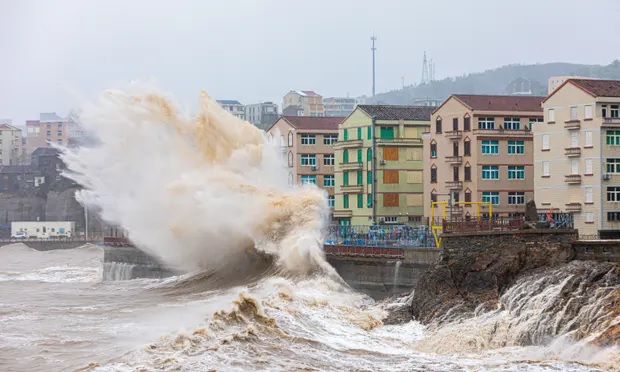
Massive gulfs
What is clear at Cop27 is that, even apart from reopening questions over liability and compensation, there are still big gulfs between developed and developing countries on the question of loss and damage. The EU’s move might have dramatically withdrawn the battle lines – how will China respond? And the US? – but mistrust remains.
Many developing countries were publicly cautious over the EU’s proposals. “There’s only one option for small island developing states, a financing fund that delivers a just pathway for the future of our countries. Division and delay tactics will not work. This is a matter we defend on the basis of justice,” said Carla Barnett, secretary general of the Caribbean Community.
The Guardian has been told that other developing countries privately welcome the move by the EU, but are wary of saying so publicly for fear of China’s wrath.
Loss and damage is not about liability and compensation, says Meena Raman, director of Third World Network and an expert on the climate negotiations – it is about honouring and respecting the principles of the UNFCCC and the Paris agreement. “Loss and damage completely fits with what countries accept when it comes to equity, justice and differentiated responsibility, and should be treated the same way as mitigation and adaptation. The reason for blocking is very simple – it’s about the scale of the loss and damage, and the financial implications of this for developed countries.”
Outside the climate talks, the notion of reparations is not only confined to loss and damage in the climate sphere – it is about wider economic and social justice, even though the terms are sometimes used interchangeably.
“Reparations as a concept is very deep, but those who say that it’s controversial are trying to make it toxic. The word ‘reparations’ hasn’t been opposed or argued over by the parties, it hasn’t been mentioned in the halls,” Raman said.
Activists say the demand for climate reparations is also about rejecting climate capitalism – the loans and private sector involvement in climate finance being pushed by developed countries. “The private sector is all about returns on investment, not social justice. In loss and damage there’s no return on your investment, it needs to be public-sector grants, not loans,” said Raman.
Harpreet Kaur Paul, a human rights lawyer, said she backed loss and damage claims, which were testament to decades of campaigning by small island states, countries vulnerable to flooding such as Bangladesh, as well as pressure from civil society.
But loss and damage as defined by the Paris agreement and the UNFCCC did not have binding mechanisms “to ensure that commitments are based on responsibility and accountability for the problems”, Paul said. As a result, what finance was on offer from richer countries was in many cases double-counted aid funding, or even just money for NGOs or private insurance.
“I’m not saying that we don’t advocate for loss and damage finance,” Paul said. “It’s important that frontline communities that are struggling to survive get something and that’s why it has been advocated for, but it’s not reparations, and shouldn’t be equated with reparations.”
Life and death issue
For Indigenous people on the frontline of environmental and climate injustices, such as Alaska villagers being forced to move because the permafrost is melting, loss and damage is a life and death issue, according to Tom Goldtooth, executive director of Indigenous Environmental Network, who has attended almost every Cop.
“In the climate space, Indigenous peoples don’t often use the word reparations – we talk about the loss of culture and language and livelihoods like fishing and hunting due to the changing unpredictable climate. Reparations for us isn’t about compensation, it’s about the colonial government recognising and respecting its responsibilities in providing services and interventions to help ensure our survival,” said Goldtooth, of the Dine’ and Dakota people.
“Loss and damage for us means a funding mechanism to give money directly to our communities to address the historic, current and future impacts of climate colonialism, that comes from a rights-based approach recognising individual and Indigenous people’s collective rights,” he said. “This requires pushing for systemic changes in the UNFCCC where there is a lot of inequity because it is dominated by industrialised countries of the EU and US who bring a colonial framework.”
Stern suggests that the urgency of the loss and damage issues means that getting started now is more important than crafting perfect mechanisms for funding, as these can be added later. He wants a refinancing of the World Bank, which he says would cost $9bn over several years, shared among all the developed countries, enabling the Bank to raise about half of the $2.4tn he says should flow to developing countries in all forms of climate finance by 2030.
“These sums are not scary,” he says. “They are about 5% more than the current investment [much of which goes to fossil fuels and high-carbon infrastructure]. We could if we wanted to get started quickly.”
cover photo: Climate activists protest at Cop27 in Sharm el-Sheikh, Egypt. Photograph: Peter Dejong/AP


